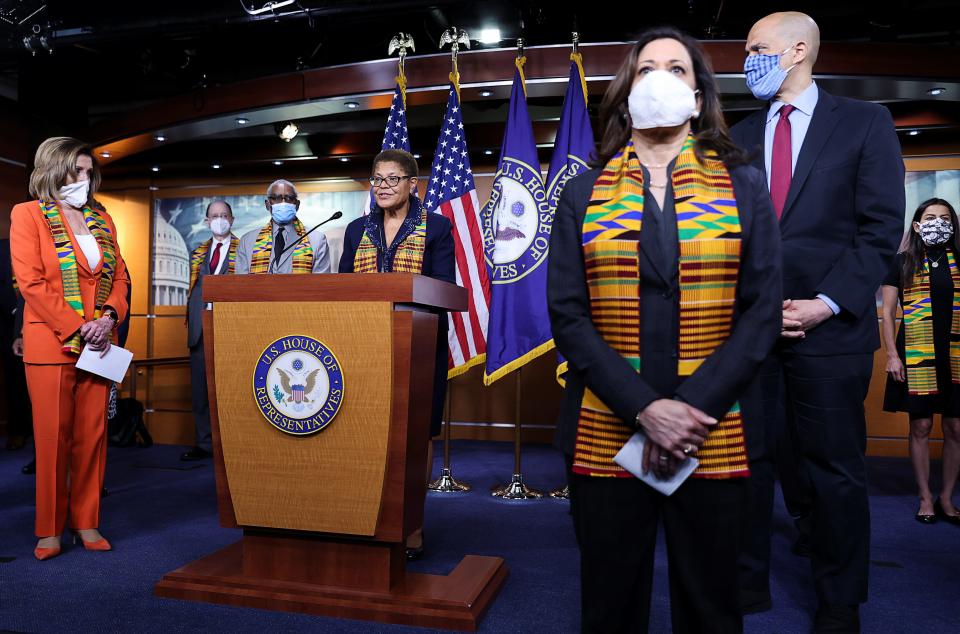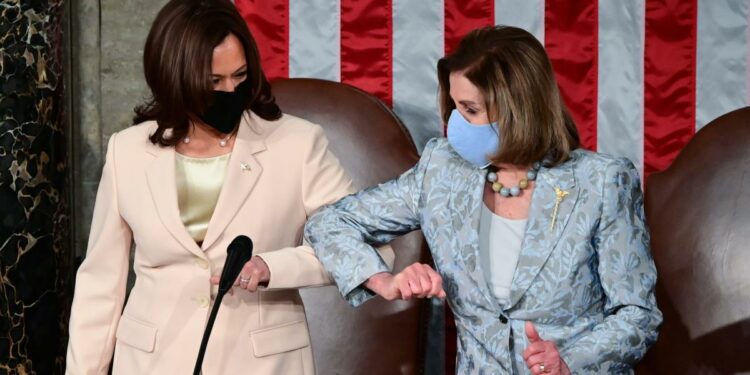Vice President Kamala Harris, her husband Douglas Emhoff and House Speaker Nancy Pelosi sing the National Anthem during a memorial service for the late Queen Elizabeth II at Washington National Cathedral Wednesday, Sept. 21, 2022.
In typical Pelosi style, she not only entered the race. She won.
Lauter, whose mother is a close friend of Pelosi, then made a prediction: One day she would be House speaker.
A few years later, Harris would begin making a name for herself in political circles. A prosecutor in the Alameda County District Attorney’s office, she formed friendships and developed allies within the local political world. Those friendships led to a position in the San Francisco district attorney’s office and a short-lived romantic relationship with Brown, along with several state board positions and involvement in local campaigns.
Longtime political operative Alex Tourk first met Harris in 2000 when party officials asked them to help with a tight runoff in the supervisorial election campaign of Rev. Amos Brown, who is now the head of the San Francisco NAACP.
“I got to spend six weeks, seven days a week, 14 hours a day, side by side with her,” Tourk said. “And I knew then that this was someone who was special, who just had immense leadership abilities, could articulate strategy, (and was) incredibly, you know, inspiring.”
Harris was elected California attorney general in 2010. Six years later, when Democrat Barbara Boxer retired from the U.S. Senate, Harris ran for that seat and won, placing her in the same office where she interned under Sen. Alan Cranston of California during college. Her star clearly on the rise, Harris ran for president in 2019, but her campaign sputtered and she dropped out before the first primary or caucus vote was cast. Within months, though, Biden came calling. He had wrapped up the Democratic nomination and needed a running mate.
He wanted Harris to be his vice president.
‘A daughter of California’: How a Kamala Harris presidency could shake things up

House Speaker Nancy Pelosi listens with Senators Kamala Harris (D-CA) and Cory Booker (D-NJ) as Congressional Black Caucus Chairwoman Representative Karen Bass (D-CA) addresses reporters during a news conference on police reform and racial injustice.
‘Not confined by convention’
San Francisco, population 808,437, is a good training ground for politicians with ambitions for state or national office.
One of the most competitive political environments in the country, officer seekers must learn to navigate an electorate that is diverse, passionate and actively involved in the political process.
“We have more democratic clubs and neighborhood organizations than probably any other town in America,” said Dale Carlson, a veteran San Francisco lobbyist and public relations consultant. “People in this town are engaged. … And so if you come up through politics here, you’ve really had to master the ability to get along with very diverse, very competing interests. And it gives you an edge.”
San Francisco’s electorate is a lot more moderate than people assume, Carlson said, and voters are discerning. People don’t tend to vote straight ticket or automatically support ballot measures because they’re told to.
“If you’re successful in San Francisco,” Carlson said, “you’re a step ahead. You’ve mastered the game at a different level.”
To maneuver through San Francisco politics requires unique coalition building, Tourk said.
“We don’t agree on much in San Francisco,” he said. “Some would think the bluest city and the bluest state in America, that we would be holding hands on most issues. But unfortunately, it’s not that way, and it can be a very energetic group of people trying to move their kind of unique policy vision forward.”
Those who successfully navigate the system, like Pelosi and Harris, apply the lessons learned in San Francisco when they move on to higher office.
Harris “has this keen ability to see people in their circumstances, and in many cases, can identify with them,” Etienne said. “People can identify with her, see themselves in her, in her own story.”
In Washington, Pelosi and Harris have the California way of wanting to do big, bold things for the country, Etienne said.
“Both of them are big thinkers,” she said. “They’re not confined by convention. They kind of start with the impossible, what people would think is impossible, they work backwards from there to make it possible.”
Pelosi is a tactician while Harris is better at putting herself in other people’s shoes, Etienne said.
“When you’re the speaker your job is to win the House,” she said. “You’ve got to be a superb strategist and a tactician. But to be the vice president or the next president United States is about vision and then how do you rally people around, how do you inspire people around a vision? They’re both just highly suited for the jobs that they actually have.”
A Barack Obama moment? Kamala Harris energizes Democrats and shakes up presidential race. Can she keep this up?
‘Democracy is on the ballot’
Last Sunday afternoon, some 700 people crowded into San Francisco’s famous Fairmont Hotel in the affluent Nob Hill neighborhood, known for its parks, art galleries and picturesque bay views. The event was a political fundraiser, and the guest list included tech-industry billionaires, titans of the business world and leading political figures like California Gov. Gavin Newsom, who also came up through San Francisco politics and was mayor.
And, of course, Pelosi and Harris.
For Harris, it was her first trip back to San Francisco since she had wrapped up the Democratic presidential nomination.
“It was a homecoming,” Tourk said. “How often is, you know, one of your own positioned to be the next president of the United States?”
Pelosi spoke first and received a standing ovation. After the crowd quieted down, she heaped praise on Harris and spoke of the campaign ahead, comparing it to the Olympics in which the difference between winning a gold, silver and bronze medal can come down to seconds.
“Elections are that close,” she said, adding later, “Democracy is on the ballot, and we want democracy to win the gold that day.”
Harris walked out a few minutes later to more cheers and another standing ovation. “We will win this election,” she said, but warned “we can take nothing for granted.”
With a mad dash ahead to introduce herself to voters over the next few weeks and lay out a policy agenda, Tourk said he wasn’t surprised Harris came back to San Francisco first. “I think she was coming home, both for resources, but also for energy as well,” he said.
She got both. The event raised $13 million for her nascent White House campaign.
Lessons from Hillary: Harris campaign faces a familiar playbook versus Trump
‘She has to win’
Only one other woman, Hillary Clinton, has ever won a major party’s presidential nomination. Harris is the first Black woman and the first Asian woman to lead a presidential ticket. If she wins the presidency, she will shatter another glass ceiling.
Harris will win, Pelosi predicted.
“She has to win,” Pelosi said during her interview with USA TODAY. “Fate of the nation is at stake.”
What advice does the former speaker have for her fellow Californian as she prepares for the difficult race against Republican Donald Trump?
“Just to be herself,” Pelosi said. “That’s my advice to everybody. Just be yourself. The authentic you, why you came here, what you believe, how you want to get things done, what your judgment is, what’s in your heart. You show them that you don’t need any advice. Do it your way.”
It’s not only how elections are won. It’s how history is made.
This article originally appeared on USA TODAY: How Kamala Harris and Nancy Pelosi broke the mold
Source link : http://www.bing.com/news/apiclick.aspx?ref=FexRss&aid=&tid=66c1db83a0fa4124820383f5930685c1&url=https%3A%2F%2Fwww.yahoo.com%2Fnews%2Fkamala-harris-nancy-pelosi-americas-090603072.html&c=10077121928960324456&mkt=en-us
Author :
Publish date : 2024-08-17 22:07:00
Copyright for syndicated content belongs to the linked Source.












